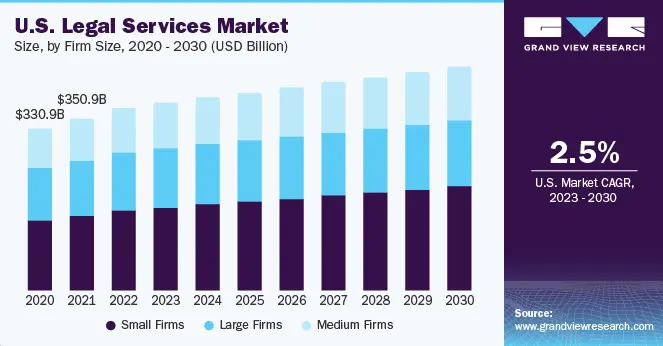Table of Contents
Over the past few decades, the legal industry has seen some significant changes. Now, integrating the legal industry with blockchain technology will offer a higher level of precision. The legal industry is revolutionizing its operations with the help of distributed ledger technology. It has made it easier for legal firms to store, validate, and maintain accurate chain of custody records without burying them under excessive paperwork.
Moreover, blockchain’s transparent, immutable, and secure nature allows lawyers to record and solve different types of legal matters. Use cases of blockchain in legal sectors include smart contracts, litigation and settlement, financial transactions, and more.
In this blog, we’ll provide insights into the key use cases, challenges, and benefits of blockchain applications in legal sector, its use cases, benefits, and challenges.
Key Stats: Applications of Blockchain in Legal Industry
Here are some key statistics on blockchain applications in legal industry.
- The global market for legal services was projected to be USD 952.29 billion in 2022, and it is projected to rise at a 4.5% CAGR by 2030.
- By 2026, half of office workers at multinational corporations will receive some sort of AI augmentation, either to increase output or improve the caliber of their job.
- 41% of law firms will use blockchain for transactional legal services.
- 21% of legal services providers will use blockchain for business assistance.
Top Use Cases of Blockchain in the Legal Industry
Blockchain technology is changing the legal field. This section explains how blockchain is being integrated into various legal services. You’ll discover the use cases of blockchain in legal and how it’s improving efficiency and making the process more secure.
Smart Legal Contracts Development
Long before the outbreak, there was a significant shift towards digital contracts requiring electronic signatures, eliminating the need for physical presence. Legal Contract Management Software Development has been instrumental in enabling this transition.
Furthermore, blockchain in smart contract handling limits payment disputes, as smart contracts can be presented in funds when each contract term is fulfilled. However, if the contractual terms are not adhered to, the stop of services is immediately implemented. This effect on lawyers’ workflow means they don’t have to spend hours trying to comply with agreements. In addition, because of the streamlined and secure procedure, the possibility of contract disputes diminishes.
Digital Notarization on Blockchain
Notaries can be used by both individuals and companies to verify documents and signatures before an official witness. But thanks to blockchain technology hashes, they can also authenticate documents. Additionally, the public and private keys can be utilized to verify the identity of the document’s owner, using blockchain in legal industry as a powerful tool for traditional notaries.
However, since public notaries are officials in the state, Blockchain is likely to replace notaries with significant and expensive changes to the institution.
However, there are a number of startups that offer notary blockchain services, such as Stampary as well as Blocksign.
Intellectual Property (IP) Protection
One of the crucial use cases of blockchain in legal industry is that it impacts intellectual property called non-fungible-tokens, also known as NFTs. These are cryptographic tokens that can be used to identify exclusive property on a blockchain. NFT standards permit robust property rights systems in the digital world.
With application of blockchain in legal sector , creators of a product or piece can submit, sign, and time-stamp their initial work in the public ledger to provide undisputed evidence of ownership. Then, a Blockchain-based IP enforcement system can aid creators in tracking precisely how and to what extent their work is being utilized.
Chain of Custody
Chain of custody is the method of managing evidence from the moment it is taken into custody until it can be used as evidence in the legal court. Evidence moves around many times. The parties who are interested log evidence into the storage facility and then physically sign documents that form a paper trail that records the movement of evidence.
This process, however, provides several opportunities for evil actors to discredit the evidence. It also allows defense lawyers to assert that the evidence was altered. Blockchain in legal sector could create and keep track of a unique evidence token for each piece of information collected and received. It can be accessed and analyzed on an open and private blockchain.
Dispute Resolution Platforms
There is always a requirement for a human, empathetic aspect in dispute resolution. However, traditional dispute resolution takes both time and money and may become a complex process. Many factors can complicate it, including potential biases, legal boundaries, and rules applicable to the parties. However, using smart contracts for dispute resolution will help you understand the complex.
Companies like Kleros or Jury Online already offer dispute resolution using blockchain in legal sector. In the event of an issue, jurors are randomly chosen to concentrate on the matter. Kleros is an example, and it lets jurors who want to join the pool do so by purchasing a token, Pinakion. The funds are kept in an escrow account and will be distributed to the winner.
Litigation Financing
Litigation refers to the process initiated by opposing parties to enforce or defend legal rights. It is settled through agreements between parties; however, sometimes, a jury or judge in a court also decides it.
The issues that fall under litigation may vary from banking transactions to contracts involving regulatory processes such as restructuring, disputes, and mergers and acquisitions.
Litigation is a range of actions that must be carried out before, during, and after an action to enforce an obligation of law. It can include negotiating pre-suit agreements or arbitrations, appeals, and facilitation.
As with other legal processes, the litigation process is time-consuming and requires lots of paperwork.
Transferring litigation to blockchain could reduce the duration and bring greater transparency.
Unlock the Future of Law with Blockchain
Regulatory Compliance
Blockchain application in legal sector provides us with the foundation to build an open ledger system in which diverse parties can timely report their compliance data or documents to the authorities of their choice. In addition, a blockchain-based system could automate a variety of legal functions, including tax compliance.
Legal Process Automation
One of the more well-known applications of blockchain in legal industry is document management. In the past, legal documents such as deeds, contracts, and wills were kept and processed using paper or central digital databases, prone to errors, fraud, and unauthorized revisions. With blockchain technology, lawyers can now access an efficient and secure platform to organize and verify crucial documents.
Data Protection & Privacy
Another one of the use cases of blockchain in legal sector is that it provides the ability to be transparent and indefinite. However, its transparency may pose a challenge when it comes to sensitive or confidential information in fraud prevention. Certain types of fraud prevention applications might require privacy measures to shield the identities of individuals or sensitive data from being exposed to the public.
New solutions, such as zero-knowledge proofs and other privacy-enhancing technologies, are designed to create an equilibrium between transparency and privacy within blockchain networks. By selectively disclosing data and using cryptographic methods, blockchain application in in legal industry can guarantee confidentiality while maintaining the security and integrity of the blockchain network.
Blockchain-based Arbitration
In a blockchain-based arbitration system, users write their agreements into an electronic smart contract that manages the arbitration process. These agreements are seamlessly integrated with smart contract codes to guarantee the legality of any arbitral award.
An integrated reputation system may aid the community in choosing arbitrators who can resolve disputes. A prominent use cases of blockchain in legal industry includes arbitration systems that can create an all-encompassing, global legal system offering low-cost, high-quality online dispute resolution.
Tokenization of Legal Assets
Tokenization is another of the use cases of blockchain in legal sector. It is a technique that converts rights into assets into digital tokens. The parties interested can issue tokens through a platform that supports smart contracts that allow the sale and purchase of the token through exchanges. In conjunction with IP rights and microtransactions, this blockchain application in legal sector creates a new world where creators can tokenize their work and legally sell a portion of the assets they own.
For instance, artists could tokenize and record the work on an open Ethereum blockchain, build an authorization around it, and then program real-time royalty payments. This framework opens the possibility for widespread fragmentation of artwork ownership.
Contract Lifecycle Management
Dealing with employee agreements and contracts can prove challenging for HR professionals or business owners, especially in companies that don’t have internal legal departments. With many contracts to write or review and revise frequently, vital information can easily fall between the cracks.
To boost economic growth, micro-businesses and startups are trying to improve the efficiency of their operations, which means reducing the time and effort they spend on non-essential tasks that are not business-related. Blockchain application in legal sector helps with this.
E-discovery and Digital Evidence Management
Legal proceedings usually contain digital evidence, ranging from electronic documents and emails to metadata from social media and other content. The digital revolution has resulted in Electronic Discovery, also known as E-Discovery, becoming an integral part of contemporary litigation. However, as the quantity and complexity of digital evidence continue to grow, the old methods of discovery are becoming more inefficient and expensive.
Blockchain application in legal industry is an amazing technological advancement poised to transform the way we deal with E-Discovery in the field of digital evidence. AI-powered tools aren’t just automated tasks; they’re becoming indispensable partners for lawyers as they attempt to navigate through the digital landscape and find crucial evidence.
Receiving Legal Fees in Cryptocurrency
A prominent use cases of blockchain in legal industry is – law firms accepting cryptocurrency payments. But, they can also hold value and be more precious property forms such as stock certificates or gold, art, and many other items.
Legal firms must know cryptocurrency as a valuable asset rather than money because it cannot be stored in any bank.
It is important to acquire an account with a cryptocurrency wallet you intend to accept, including Bitcoin or Ethereum, for processing cryptocurrency transactions in your firm. Additionally, you should consider using a cryptocurrency exchange to convert received cryptocurrency into fiat currency, which allows you to exchange your investments for traditional currency.
The Authentication of Documents Using Blockchain
One of the most significant problems in the legal system is verifying documents and determining whether they are authentic or have been altered. This is where blockchains can assist in transforming the legal system.
Since everything is based on hard evidence, all digitally digitized evidence can be safely stored on Blockchain vaults and networks. Blockchain in legal sector uses permanent, irrevocable archives of access and storage analyzing rations that leave a clear trail to identify any suspicious activity.
This is a secure method of saving digital or document-based evidence used in the legal field. For instance, NFTs can be brought onto blockchains to monitor a firm’s business activities.
Intellectual Property Royalty Payments
As the world has become digital, more instances of intellectual property theft have been documented. In the last few years, protecting the rights to intellectual property has nearly been impossible, putting the lives of artists and authors at risk. However, blockchain applications in Legal industry can assist IP lawyers in providing evidence when first scanned and rights management.
While the blockchain isn’t able to stop the misuse of copyrighted material. It could help lawyers to manage their client’s rights. By blockchain application in legal industry, a lawyer can create the conditions of sale and the license to an IP for their client. Artists can also put their copyrights in a smart contract, which will pay out in the event that certain conditions are met. Platforms like TinEye, Bonded, Pixsy, and Mediachain have already enabled the registration of content via the blockchain.
Fraud Prevention
Fraud has become a serious problem for both individuals and businesses. It’s any deliberate fraud or deceit carried out to gain an unfair advantage or inflict damage. Fraudulent activities could result in significant loss of money, damage to reputation, and loss of trust.
Traditional security and detection methods, like manual audits or rules-based systems, have proven ineffective in preventing sophisticated fraud strategies. Legal Audit Software Development plays a crucial role in addressing these challenges. Another major use case of blockchain in the legal industry is fraud prevention. There is a demand for novel approaches to detect and block fraudulent activities in real-time.
Decentralized Jury Systems
Blockchain application in legal industry for jury trials has yielded promising results in analyzing vast amounts of data, finding patterns, and providing valuable information to back up legal arguments.
In the last few years, blockchain have been used to aid lawyers in jury trials. These AI systems can evaluate large quantities of evidence in a short time and with precision. Utilizing the natural processing of languages and machine-learning algorithms, these systems can find relevant information in transcripts, documents, audio recordings, transcripts, and video footage.
One of the main use cases for blockchain in legal industry for jury trials lies in its capacity to spot patterns and relationships in the evidence. The AI system is able to detect connections that might not be immediately obvious to humans. Legal teams can build stronger arguments and deliver more convincing arguments.
What are the Benefits of Blockchain Applications in the Legal Industry?
The legal sector is experiencing the digital revolution due to the growth of Blockchain and Artificial Intelligence. These cutting-edge technologies aren’t just streamlining legal processes; they are changing the way that legal professionals work. From document security to dispute settlement, Blockchain applications in legal sector provide a wealth of benefits to the legal industry of the future. Here are some of the key advantages that are changing legal procedures across the world.
Enhanced Document Security
One of the major advantages of blockchain in legal industry is its ability to offer secure, tamper-proof document storage. With blockchain technology, delicate legal documents are stored in decentralized systems, so they can’t be altered or compromised. This protects the integrity of agreements, contracts, and other legal documents.
Legal professionals can save their documents with complete certainty that any change will be recorded, which provides unparalleled security and transparency.
Smart Contracts
Say goodbye to the manual process of contract execution. Smart contracts are powered by blockchain technology and automatically apply conditions and terms, removing the necessity for intermediaries. Self-executing contracts are mutable and transparent, which makes them ideal for legal contracts where security and trust are crucial.
Through the integration of smart contract capabilities, blockchain application in legal sector allows lawyers and customers to streamline contract procedures, making them more efficient, secure, and robust.
Cost Efficiency
AI automation can reduce the requirement for manual tasks such as document drafting, reviewing, filing, and review. This reduces time and lowers the operational cost for law firms. Due to AI’s accuracy and speed, things that were once time-consuming can now be accomplished in just a few minutes.
Faster and More Accurate Legal Research
Traditional legal research is lengthy and labor-intensive. AI-powered tools enable lawyers to study huge collections of legislation, case law, and precedents for law in just a fraction of the time. These tools deliver quicker, more precise outcomes, allowing legal professionals to concentrate on more strategic projects.
Predictive Analytics for Case Outcomes
Predictive analytics, aided by AI, can help lawyers evaluate the likelihood of success in cases by looking at past records. This aids in the development of more informed legal strategies, providing clients with a better understanding of the likelihood of success.
Global Accessibility and Flexibility
Each AI and blockchain enable lawyers and their users to collaborate from anywhere around the globe. Legal documents are signed electronically, and research conducted via the Internet is undertaken via blockchain smart contracts. Without the need for physical meetings or manually drafted paperwork, blockchain smart contracts may be implemented globally.
Improved Dispute Resolution
Blockchain is a revolutionary technology for dispute resolution. It provides precise and tamper-proof records of all communications and transactions. This transparency makes mediation and arbitration procedures quicker and fair.
Challenges and Opportunities for Blockchain in the Legal Services
It’s not a fact that the legal sector is among the most conservative. Unsurprisingly, blockchain application in legal industry, which underlies Bitcoin, NFTs, and other cryptocurrencies, is facing significant challenges to its acceptance within the legal industry. This section will address some of the more prevalent legal issues encountered by blockchain-based startups and the best ways to overcome the problems.
Regulatory Uncertainty
Uncertainty in regulatory compliance is a significant legal hurdle facing blockchain-based startups. Because of blockchain technologies’ decentralization, it’s sometimes difficult to identify the laws and regulations that apply to a specific project.
This could be a huge issue for startups trying to raise money via an initial coin offer (ICO) or NFT. In many countries, there needs to be specific guidance regarding regulating ICOs or whether certain coins could have various significance. For instance, in one nation, the term “coin” may refer to money. It could also refer to a “virtual asset.” As a result, numerous startups were forced to put off implementing their ICO plans. They had to shift to a more favorable regulatory framework.
The best approach to overcoming this issue is to partner with a knowledgeable legal professional. They can assist you in navigating regulations and ensuring your project complies with the applicable laws and regulations.
Intellectual Property
Another issue in the legal world for blockchain-based startups is protecting intellectual property (IP). Because blockchain is a global industry, it could be challenging to apply IP rights across many countries.
This is a significant issue for startups seeking to safeguard their software. In contrast to traditional software companies, blockchain startups typically cannot depend on copyright law to protect their code. This is due to the distribution of blockchain technology. Blockchain permits anyone to copy and modify the code without authorization.
NFTs are also an issue for IP problems for companies in the early stages. Many jurisdictions have no consensus on whether NFTs are protected under trademark or copyright law. This is why many startups have had to devise new ways to safeguard their NFTs. For example, using smart contracts and other technological measures.
One solution to this problem is to use open-source licenses that permit others to use your code; however, they must give credit to the extent that it is due. Alternatively, you could use an amalgamation of copyright and trademark laws to safeguard your brand’s logo and trademark.
Data Protection
Another legal issue faced by blockchain software development companies is protecting their data. Due to the decentralization provided by blockchain technologies, it may be difficult to monitor how personal information can be collected, utilized, and stored.
This is a particular issue for startups seeking to collect data from different sources. In many countries, the law on data protection requires firms to obtain explicit consent from individuals before using their data.
When developing your blockchain project, be aware of the laws governing data protection. If you’re collecting personal data, have an explicit and clear privacy policy that describes how data is utilized, disclosed, and safeguarded.
Taxation
Another legal issue faced by blockchain startups is the tax burden. Because blockchain is a global sector, it is often difficult to know which tax laws apply to a specific venture.
This is a particular issue for startups raising capital via an ICO. In many jurisdictions, specific guidance regarding how ICOs are taxed is not yet available. In the end, many startups have had to either stall or cancel their ICO plans or switch their education and training.
Knowing the tax consequences of your blockchain project is essential to its success. Work with a knowledgeable tax lawyer or accountant to help you navigate the tax system. Ensure your blockchain project fully complies with the laws and regulations in force.
Insurance
Insurance is often required by cryptocurrency-related businesses in order to mitigate legal risks. Traditional insurance policies may cover some crypto-related risks depending upon how a specific cryptocurrency (like Bitcoin or Ethereum) is classified, like “money” or “securities.”
For startups in blockchain, it is essential to partner with a skilled insurance broker who knows the specific risks that come with blockchain technology. They can help you in finding the appropriate policy to shield your company from legal liability.
How A3Logics Can Help You Develop Blockchain Solutions for the Legal Industry?
Blockchain is a fascinating alternative to traditional currencies. It has enabled centralized banking and transformed the way transactions are conducted. In short, blockchain transforms companies and businesses in all sectors.
It has increased trust, which has resulted in greater efficiency, as it has reduced the duplication of tasks. If you’re contemplating implementing blockchain in legal tech, it’s about time you took your company to a new level of automation. Our experts can help you understand the best ways to use blockchain technology. Discuss your idea for a project with us to benefit from our top-of-the-line Blockchain Software Development Services.
Transform Your Software Vision into Reality – Book A 30 Minutes Free Consultation!
Conclusion
Blockchain could revolutionize the legal field by enhancing efficiency, transparency, and security and also providing advantages in document management, automatization, and record-keeping. This makes blockchain in legal services an attractive instrument for lawyers looking to better serve their clients and solve complex legal issues.
However, there are regulatory hurdles, scalability issues, as well as education and training. This is for legal professionals are a few of the challenges to be overcome.
When you work with a group of blockchain experts who have experience in the legal field, the challenges will be able to be solved. The development team can assist you in determining and creating the best blockchain solutions for any legal enterprise.
We invite you to contact us to find a reliable DeFi Development Company. With our cutting-edge blockchain technology, we are dedicated to transforming and improving the way you offer legal services.
We’ll partner with your team to give you an edge in the legal marketplace. We identify and implement the most suitable blockchain solutions that align with your business goals.
FAQs
How can smart contracts benefit legal professionals?
Smart contracts provide benefits like greater efficiency and security, confidence, cost savings, and autonomy. They streamline processes, decrease intermediary requirements, and ensure safe, transparent, and secure transactions.
How can blockchain support regulatory compliance in the legal sector?
Business owners, developers, users, regulatory teams, legal teams, and auditors are responsible for compliance with blockchain technology. Collaboration between all of these entities is vital to ensure that blockchain technology complies with the applicable laws and regulations.
Is blockchain suitable for managing cross-border legal transactions?
Anyone can use blockchain in legal industry for payments across borders and not only for businesses. It is a fast, reliable, secure, and frequently more affordable method to transfer funds internationally, compared to traditional banking methods.
Can law firms accept legal fees in cryptocurrency?
Attorneys can accept cryptocurrency for a retainer payment if the amount is fair and the fee arrangement is compliant with the MARPC. Cryptocurrency is considered “property” rather than “funds” to allow for ethical analysis because it is a digital commodity stored inside digital wallets.
How does blockchain improve transparency and trust in legal processes?
Blockchain’s possibilities go beyond its roots in digital currency. Yes, it’s bound to be subject to regulation, but this doesn’t limit its advantages and may increase people’s trust in the technology, thereby increasing the number of people participating in the network.
Data, records, and transaction management can be conducted with confidence, security, and transparency. It is the responsibility of business leaders to make the most of the opportunities blockchain can offer. By incorporating blockchain technology into their business operations, companies can increase their competitive advantage and secure their operations for the future.
What is the future of blockchain in the legal industry?
The legal profession needs to recognize the revolutionary power of blockchain. The first to embrace blockchain technology can benefit from a significant competitive advantage.
Through collaboration with lawyers and developers, lawyers can tap into blockchain technology to develop an efficient and secure legal system that is accessible to all.








